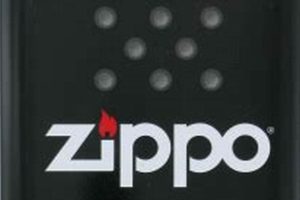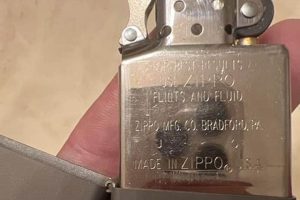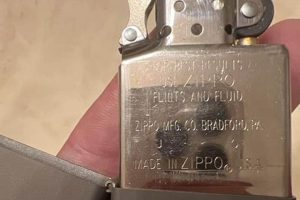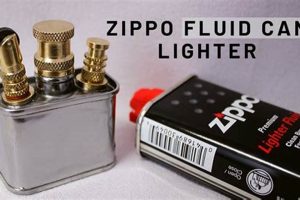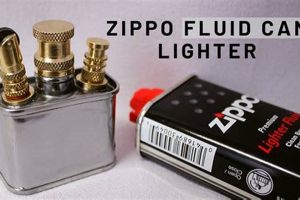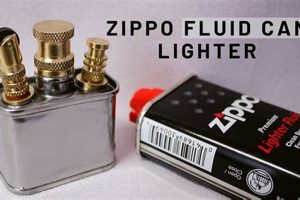Using highly flammable liquids like those designed for charcoal grills to refill pocket lighters presents significant risks. While some individuals might attempt this due to perceived cost savings or convenience, the practice can lead to dangerous outcomes. These fluids are typically formulated for open-air burning and produce a large flame, unlike the refined lighter fluids intended for contained burning within a lighter’s casing. An improper fuel can damage the lighter’s wick and internal mechanisms, resulting in malfunctions or leaks. Moreover, the volatility of grill lighter fluid increases the risk of accidental ignition and uncontrolled fires.
Purpose-designed lighter fluids are formulated for safe and controlled combustion within pocket lighters. These specialized fluids are typically more refined and less volatile, reducing the risk of dangerous flare-ups. Manufacturers design their lighters for specific fuel types, and using an incorrect fluid can compromise functionality and safety. Furthermore, proper lighter maintenance, including using the correct fuel, extends the lifespan of the device and ensures reliable operation. The potential hazards associated with misusing flammable liquids underscore the importance of adhering to manufacturer guidelines and utilizing appropriate fuels.
The following sections will explore the dangers of using improper fuels in pocket lighters, recommended safety practices, and appropriate lighter maintenance procedures. Additionally, this article will provide resources for safe lighter handling and disposal of flammable materials.
Safety Tips Regarding Flammable Liquids and Lighters
Safe handling of flammable materials and lighting devices is paramount to prevent accidents and injuries. The following tips provide crucial guidance on responsible practices.
Tip 1: Utilize purpose-designed lighter fluid. Employing lighter fluid specifically formulated for the intended device ensures optimal performance and minimizes risks associated with volatile, inappropriate fuels.
Tip 2: Store flammable liquids properly. Store all flammable materials, including lighter fluid and grill starters, in designated containers, away from heat sources, open flames, and children’s reach.
Tip 3: Exercise caution during refilling. When refilling a lighter, perform the task in a well-ventilated area, away from ignition sources. Avoid overfilling and promptly wipe away any spills.
Tip 4: Inspect lighters regularly. Periodically inspect lighters for leaks, damage, or malfunctions. Replace damaged lighters immediately and dispose of them safely.
Tip 5: Never modify lighters. Tampering with a lighter’s internal mechanisms can compromise safety features and increase the risk of malfunctions, leaks, or explosions.
Tip 6: Supervise children around flammable materials. Never allow children to handle flammable liquids or lighters. Educate them about the potential dangers associated with these materials.
Tip 7: Dispose of flammable materials responsibly. Consult local regulations regarding the proper disposal of flammable liquids and discarded lighters.
Adhering to these safety precautions significantly reduces the risk of accidents related to flammable materials and lighters, promoting a secure environment.
The following section concludes this discussion by reiterating the importance of responsible handling and providing additional resources for fire safety education.
1. Flammability
Flammability plays a crucial role in the dangers associated with using backyard grill lighter fluid in a Zippo lighter. Grill fluid is designed for open-air combustion in charcoal grills, requiring a high degree of flammability to ignite briquettes effectively. This high flammability, however, becomes a hazard when confined within the small enclosure of a Zippo lighter. The increased volatility of grill fluid compared to refined lighter fluid can lead to unpredictable flare-ups, posing a significant risk of burns and fires. For instance, attempting to refill a Zippo with grill fluid can result in spilled fluid igniting unexpectedly, causing harm to the user and surrounding objects. Even a small amount of grill fluid within the lighter’s casing can create excessive pressure upon ignition, potentially leading to the lighter bursting or ejecting burning fluid.
The difference in flammability characteristics between grill fluid and Zippo lighter fluid stems from their respective chemical compositions. Zippo premium lighter fluid is formulated for controlled combustion, producing a consistent flame height and minimizing flare-ups. Grill fluid, designed for rapid ignition of charcoal, contains more volatile components that contribute to its higher flammability. Using such a fluid in a Zippo compromises the lighter’s intended function and introduces a substantial risk of uncontrolled combustion. Consider a scenario where a user refills a Zippo with grill fluid and inadvertently spills some onto their clothing. The higher flammability of the grill fluid increases the likelihood of the spilled fluid igniting quickly and intensely, potentially causing severe burns.
Understanding the flammability characteristics of different fuels is critical for safe lighter operation. Using the correct fuel for the intended device mitigates risks associated with uncontrolled combustion and ensures predictable performance. Continued use of highly flammable grill fluid in a Zippo lighter not only damages the lighter’s components but also creates a persistent fire hazard. Therefore, adhering to manufacturer recommendations regarding appropriate fuel types is essential for safe and responsible lighter use.
2. Volatility
Volatility is a critical factor contributing to the hazards of using backyard grill lighter fluid in a Zippo lighter. Defined as the tendency of a liquid to vaporize, volatility directly influences the ease of ignition and the potential for uncontrolled combustion. Grill lighter fluid, designed for open-air burning, exhibits higher volatility compared to refined lighter fluids intended for contained combustion. This higher volatility means grill fluid produces more flammable vapors at room temperature, increasing the risk of accidental ignition. Consider a scenario where a user refills a Zippo with grill fluid in a warm environment. The elevated temperature further increases the fluid’s volatility, leading to a higher concentration of flammable vapors within the lighter’s casing. This creates a dangerous situation where even a small spark can ignite the vapors, causing a potentially violent flare-up.
The increased volatility of grill fluid also poses a significant risk during storage and handling. Storing a Zippo lighter filled with grill fluid in a pocket or enclosed space allows volatile vapors to accumulate. A sudden increase in temperature or a spark from static electricity can ignite these accumulated vapors, resulting in burns or fire. Furthermore, the higher volatility increases the likelihood of vapor leaks from the lighter, creating a persistent fire hazard in the surrounding environment. Imagine a closed vehicle compartment where a Zippo filled with grill fluid is stored. The volatility of the fluid leads to a gradual accumulation of flammable vapors within the compartment. A minor electrical spark or a lit cigarette could then ignite the concentrated vapors, resulting in a potentially devastating fire.
The inherent volatility of grill lighter fluid makes it unsuitable for use in Zippo lighters. The risks associated with increased flammability, accidental ignition, and vapor leaks underscore the importance of utilizing purpose-designed lighter fluids. These refined fluids are formulated with controlled volatility to ensure safe and predictable combustion within the lighter’s enclosed mechanism. Ignoring the volatility factor when choosing lighter fluid can lead to significant safety hazards, highlighting the need for responsible handling and adherence to manufacturer recommendations.
3. Residue
Residue accumulation poses a significant issue when backyard grill lighter fluid is used in a Zippo lighter. Unlike refined lighter fluids, grill fluid contains heavier hydrocarbons and additives that do not combust completely. This incomplete combustion leads to a buildup of gummy, carbonaceous deposits within the lighter’s wick, chimney, and flint wheel mechanism. Such residue restricts fuel flow to the wick, impeding proper ignition and resulting in a weak or inconsistent flame. Over time, the accumulated residue can completely clog the wick and render the lighter unusable. For example, repeated use of grill fluid in a Zippo can lead to a noticeable buildup of black, sticky residue around the wick and flint wheel, eventually hindering the lighter’s functionality. This residue not only affects performance but also poses a maintenance challenge, requiring frequent cleaning to restore functionality.
The impact of residue extends beyond mere inconvenience. The sticky residue can attract dust, lint, and other debris, further exacerbating the clogging issue. This buildup can also interfere with the flint wheel’s sparking action, making it difficult to ignite the lighter. In some cases, the residue can even dry and harden, effectively cementing the wick and internal components, rendering the lighter irreparable. Consider a scenario where a user consistently refills their Zippo with grill fluid over several months. The gradual accumulation of residue progressively degrades the lighter’s performance, leading to increasingly unreliable ignition and eventually requiring extensive cleaning or even replacement.
The issue of residue formation underscores the importance of using the correct fuel in a Zippo lighter. Purpose-designed lighter fluids are formulated to burn cleanly, minimizing residue buildup and ensuring consistent performance. While occasional cleaning may still be necessary, using the correct fuel significantly reduces the frequency and severity of maintenance. Choosing the appropriate fuel not only preserves the lighter’s functionality but also extends its lifespan, highlighting the practical significance of understanding the impact of residue accumulation. Continued use of grill fluid, however, will inevitably lead to performance degradation and potential damage, emphasizing the need for informed fuel selection.
4. Malfunction
Malfunctions in Zippo lighters are often directly attributable to the use of improper fuels, such as backyard grill lighter fluid. The incompatibility of grill fluid with the lighter’s design and mechanism leads to a range of issues that compromise functionality and safety. Understanding the specific malfunctions caused by grill fluid is crucial for emphasizing the importance of using the correct fuel.
- Clogged Wick
The thick consistency and incomplete combustion of grill fluid lead to rapid wick clogging. This restricts fuel flow, resulting in a weak flame or complete failure to ignite. A clogged wick requires frequent cleaning or replacement, impacting the lighter’s usability. For example, a user attempting to light a cigarette may find the flame sputtering and dying due to a wick clogged with grill fluid residue. This necessitates inconvenient cleaning or wick replacement.
- Flint Wheel Failure
Residue from grill fluid can accumulate on the flint wheel and sparking mechanism, hindering spark generation. This can lead to difficulty igniting the lighter, requiring excessive striking or even rendering the lighter temporarily unusable. Imagine a user attempting to light a campfire in windy conditions. A malfunctioning flint wheel due to grill fluid residue can make ignition extremely challenging, potentially delaying or preventing fire starting.
- Fuel Leak
The incompatibility of grill fluid with Zippo’s seals and gaskets can cause them to degrade and leak. Fuel leaks create a fire hazard and waste fuel, rendering the lighter unreliable and potentially dangerous. A lighter leaking grill fluid inside a pocket can pose a significant risk, as the highly volatile fluid can easily ignite from body heat or friction.
- Unreliable Flame
The inconsistent burning characteristics of grill fluid lead to an unreliable flame in a Zippo lighter. The flame may sputter, flare up unexpectedly, or die out quickly, making the lighter unsuitable for its intended purpose. A user relying on their Zippo to light a candle in a dimly lit room may experience frustration and potential danger due to the unpredictable flame caused by grill fluid.
These malfunctions, stemming from the use of backyard grill lighter fluid, highlight the importance of adhering to manufacturer recommendations. Utilizing the correct fuel ensures optimal performance, prevents damage, and mitigates safety risks. Continued use of improper fuels like grill fluid not only compromises functionality but also jeopardizes the longevity of the Zippo lighter, emphasizing the need for informed fuel selection and responsible lighter maintenance.
5. Damage
Damage to Zippo lighters resulting from the use of backyard grill lighter fluid represents a significant concern. The incompatibility of this fuel with the lighter’s design and materials leads to various forms of degradation, compromising both functionality and longevity. The corrosive nature of some grill fluid components can attack the lighter’s metal casing, leading to pitting, discoloration, and weakening of the structure. Internal components, such as the cotton packing and rayon balls, are also susceptible to damage. The heavier hydrocarbons and additives present in grill fluid can leave behind gummy residues that clog the wick and hinder fuel flow. This residue buildup can also affect the flint wheel mechanism, impeding spark generation. Over time, repeated exposure to grill fluid can cause the lighter’s internal components to deteriorate, requiring costly repairs or even rendering the lighter unusable. For instance, a vintage Zippo lighter, prized for its collectible value, could suffer irreparable damage from the corrosive effects of grill fluid, diminishing its aesthetic and monetary worth.
The damage caused by grill fluid isn’t limited to the lighter itself. Spilled grill fluid can damage surfaces it comes into contact with. The volatile nature of the fluid poses a risk to finishes on furniture, countertops, and other household items. Furthermore, improper storage of a Zippo filled with grill fluid can lead to leaks, potentially damaging clothing, bags, or other personal belongings. Consider a scenario where a lighter leaks grill fluid inside a car’s glove compartment. The fluid can damage the compartment’s lining, potentially staining or even melting the plastic. The lingering odor of the volatile fluid can also permeate the vehicle’s interior, creating an unpleasant and persistent nuisance.
Understanding the potential for damage associated with using backyard grill lighter fluid in a Zippo underscores the importance of using the correct fuel. Purpose-designed lighter fluids are formulated to be compatible with the lighter’s materials and mechanisms, minimizing the risk of damage and ensuring optimal performance. Choosing the correct fuel preserves the lighter’s functionality, extends its lifespan, and protects surrounding surfaces from potential damage. The long-term costs associated with repairing or replacing a damaged lighter, as well as the potential damage to personal property, far outweigh any perceived cost savings from using an improper fuel like grill fluid. Responsible lighter maintenance and adherence to manufacturer recommendations are essential for preventing damage and ensuring the safe and effective operation of a Zippo lighter.
6. Safety Risk
Utilizing backyard grill lighter fluid in a Zippo lighter presents substantial safety risks. The fluid’s high volatility increases the likelihood of accidental ignition. Unlike refined lighter fluid designed for controlled combustion within a lighter’s casing, grill fluid vaporizes readily at room temperature, creating an environment conducive to uncontrolled fires. A seemingly innocuous spark, static electricity, or even ambient heat can ignite these vapors, leading to potentially severe burns or property damage. Consider a scenario where a Zippo filled with grill fluid is inadvertently dropped, causing the lighter to leak. The spilled fluid, combined with the volatile vapors, can quickly ignite, posing an immediate fire hazard.
Further amplifying the safety risk is the potential for malfunction and unpredictable flames caused by grill fluid’s incompatibility with Zippo lighters. Residue buildup from incomplete combustion can clog the wick and internal mechanisms, leading to erratic flame behavior, fuel leaks, and potential explosions. A lighter malfunctioning due to improper fuel can transform a simple lighting task into a dangerous situation. For instance, a sudden flare-up while lighting a cigarette could cause facial burns or ignite nearby flammable materials. Moreover, attempting to refill a Zippo with highly flammable grill fluid increases the risk of spills and subsequent ignition, potentially causing significant harm.
Mitigating these safety risks requires strict adherence to manufacturer recommendations and utilizing only the appropriate fuel for Zippo lighters. Understanding the inherent dangers of using highly volatile and incompatible fuels is crucial for responsible lighter handling. The potential consequences, ranging from minor burns to significant property damage, underscore the importance of prioritizing safety and avoiding the use of backyard grill lighter fluid in Zippo lighters. Promoting fire safety awareness and proper fuel selection contributes significantly to reducing the incidence of accidents related to lighter use.
7. Improper Fuel
The concept of “improper fuel” is central to understanding the hazards associated with using backyard grill lighter fluid in a Zippo lighter. Using a fuel not specifically designed for a particular device can lead to a cascade of negative consequences, ranging from malfunctions and reduced performance to severe safety risks. In the context of Zippo lighters, backyard grill lighter fluid exemplifies an improper fuel, posing significant threats to both the lighter’s functionality and the user’s safety.
- Chemical Incompatibility
Grill lighter fluid possesses a different chemical composition than Zippo premium lighter fluid. This chemical incompatibility is the root cause of numerous problems. Grill fluid often contains heavier hydrocarbons and additives not present in refined lighter fluids. These substances do not burn cleanly, leading to residue buildup that clogs the wick, hinders fuel flow, and interferes with the flint wheel mechanism. The chemical incompatibility also contributes to the degradation of the lighter’s internal components, such as seals and gaskets, increasing the risk of fuel leaks. For example, the higher concentration of volatile organic compounds (VOCs) in grill fluid can damage the rubber seals in a Zippo, leading to evaporation and leakage.
- Performance Degradation
Using grill fluid in a Zippo inevitably leads to performance degradation. The residue buildup from incomplete combustion restricts fuel flow to the wick, resulting in a weak, inconsistent flame or complete failure to ignite. The flint wheel mechanism can also become clogged with residue, making sparking difficult or impossible. This performance degradation renders the lighter unreliable and unsuitable for its intended purpose. A user relying on their Zippo in an emergency situation may find it unusable due to the performance issues caused by improper fuel.
- Safety Hazards
The use of grill fluid in a Zippo introduces significant safety hazards. The higher volatility of grill fluid compared to refined lighter fluid increases the risk of accidental ignition and uncontrolled fires. Leaks caused by degraded seals further exacerbate this risk. Moreover, the unpredictable flame behavior and potential for malfunction create dangerous situations. A seemingly simple task, such as lighting a candle, can become hazardous due to unexpected flare-ups or fuel leaks. These safety hazards pose a threat to both the user and the surrounding environment.
- Lighter Damage
Using grill fluid as fuel can cause irreparable damage to a Zippo lighter. The corrosive nature of certain components in grill fluid can damage the metal casing, leading to pitting and discoloration. Internal components, including the wick, cotton packing, and flint wheel mechanism, are also susceptible to damage from residue buildup and chemical degradation. This damage reduces the lighter’s lifespan and can ultimately render it unusable. A vintage or collectible Zippo can lose significant value due to the damage caused by improper fuel.
In conclusion, the use of backyard grill lighter fluid in a Zippo lighter exemplifies the detrimental effects of using an improper fuel. The chemical incompatibility, performance degradation, safety hazards, and potential for lighter damage underscore the importance of adhering to manufacturer recommendations and using only the designated fuel. The risks associated with improper fuel use far outweigh any perceived cost savings or convenience, highlighting the need for responsible lighter maintenance and fuel selection.
Frequently Asked Questions
This section addresses common inquiries regarding the use of backyard grill lighter fluid in Zippo lighters, clarifying misconceptions and emphasizing safe practices.
Question 1: Can backyard grill lighter fluid be used in a Zippo lighter as a substitute for regular lighter fluid?
No. Using grill fluid in a Zippo is strongly discouraged. It is an improper fuel, chemically incompatible with the lighter’s design and materials, leading to malfunctions, damage, and safety hazards.
Question 2: What are the risks associated with using grill lighter fluid in a Zippo?
Risks include increased flammability leading to uncontrolled fires, residue buildup causing malfunctions, damage to internal components, unreliable flame behavior, and potential fuel leaks. These risks pose significant threats to safety and lighter functionality.
Question 3: Will using grill fluid void the Zippo warranty?
While Zippo’s warranty doesn’t explicitly mention specific fuel types, damage caused by improper fuels likely won’t be covered. Using grill fluid can lead to malfunctions and damage that invalidate warranty claims.
Question 4: Is it safe to store a Zippo filled with grill fluid?
Storing a Zippo filled with grill fluid is highly unsafe due to increased volatility and the risk of leaks. The volatile nature of grill fluid increases the risk of accidental ignition, even during storage.
Question 5: How can one clean a Zippo lighter affected by grill fluid residue?
Cleaning a Zippo affected by grill fluid residue requires disassembly, careful cleaning of all parts with appropriate solvents, and thorough drying before reassembly. However, some damage may be irreversible.
Question 6: What type of lighter fluid is recommended for Zippo lighters?
Zippo premium lighter fluid is the recommended fuel. It is specifically formulated for optimal performance and compatibility with Zippo lighters, ensuring safe and reliable operation.
Using the correct fuel is crucial for safe and reliable lighter operation. Deviation from manufacturer recommendations can result in significant risks and damage. Prioritizing safety and adhering to proper fuel usage guidelines ensures optimal performance and longevity of Zippo lighters.
The following section offers concluding remarks and additional resources related to fire safety and proper lighter maintenance.
Conclusion
This exploration of using backyard grill lighter fluid in Zippo lighters reveals significant risks and disadvantages. The chemical incompatibility between grill fluid and Zippo lighters leads to numerous issues, including residue buildup, malfunctions, decreased performance, potential damage to the lighter, and substantial safety hazards. The highly volatile nature of grill fluid increases the risk of accidental ignition and uncontrolled fires, posing a threat to both users and their surroundings. Furthermore, the use of improper fuel can void warranties and shorten the lifespan of these otherwise durable lighters. The analysis underscores the importance of adhering to manufacturer recommendations and using only Zippo premium lighter fluid for optimal performance and safety.
Safe and responsible lighter use requires a thorough understanding of the potential hazards associated with improper fuel selection. Choosing the correct fuel is paramount for maintaining lighter functionality, preventing damage, and mitigating safety risks. Continued education on proper lighter maintenance and fuel selection is crucial for reducing accidents related to lighter use. Ultimately, prioritizing safety and adhering to manufacturer guidelines ensures the reliable and safe operation of Zippo lighters, preventing potentially dangerous outcomes associated with using backyard grill lighter fluid.


